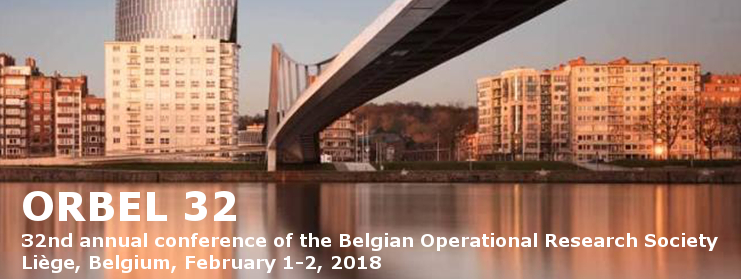ScheduleClick on a link for more detailsShow all the abstracts Download the booklet of abtracts
Thursday 11:00 - 12:20 Routing Problems Room 138 - Chair: Pieter Vansteenwegen
Thursday 11:00 - 12:20 Emergency operations scheduling Room 130 - Chair: El-Houssaine Aghezzaf
Thursday 11:00 - 12:20 Algorithm design Room 126 - Chair: Gerrit Janssens
Thursday 11:00 - 12:20 Multiple Objectives Room 120 - Chair: Filip Van Utterbeeck
Thursday 13:30 - 14:50 Integrated logistics Room 138 - Chair: Kris Braekers
Thursday 13:30 - 14:50 Person transportation Room 130 - Chair: Célia Paquay
Thursday 13:30 - 14:50 Continuous models Room 126 - Chair: Nicolas Gillis
Thursday 13:30 - 14:50 Integer programming Room 120 - Chair: Bernard Fortz
Thursday 15:20 - 16:20 Material handling and warehousing 1 Room 138 - Chair: Greet Vanden Berghe
Thursday 15:20 - 16:20 Operations management Room 130 - Chair: Roel Leus
Thursday 15:20 - 16:20 Matrix factorization Room 126 - Chair: Pierre Kunsch
Thursday 16:30 - 17:10 Material handling and warehousing 2 Room 138 - Chair: Katrien Ramaekers
Thursday 16:30 - 17:10 Routing and local search Room 130 - Chair: An Caris
Thursday 16:30 - 17:10 Traffic management Room 126 - Chair: Joris Walraevens
Thursday 16:30 - 17:10 Pharmaceutical supply chains Room 120 - Chair: Bart Smeulders
Friday 10:50 - 12:10 Optimization in health care Room 138 - Chair: Jeroen Beliën
Friday 10:50 - 12:10 Network design Room 130 - Chair: Jean-Sébastien Tancrez
Friday 10:50 - 12:10 Local search methodology Room 126 - Chair: Patrick De Causmaecker
Friday 10:50 - 12:10 ORBEL Award Room 120 - Chair: Frits Spieksma Friday 13:00 - 14:00 Production and inventory management Room 138 - Chair: Tony Wauters
Friday 13:00 - 14:00 Logistics 4.0 Room 130 - Chair: Thierry Pironet
Friday 13:00 - 14:00 Data clustering Room 126 - Chair: Yves De Smet
Friday 13:00 - 14:00 Collective decision making Room 120 - Chair: Bernard De Baets
Friday 14:10 - 15:10 Sport scheduling Room 138 - Chair: Dries Goossens
Friday 14:10 - 15:10 Discrete choice modeling Room 130 - Chair: Virginie Lurkin
Friday 14:10 - 15:10 Data classification Room 126 - Chair: Ashwin Ittoo
|
|||||||||||||||||||||||||||||||||||||||||||||||||||||||||||||||||||||||||||||||||||||||||||||||||||||||||||||||||||||||||||||||||||||||||||||||||||||||||||||||||||||||||||||||||





